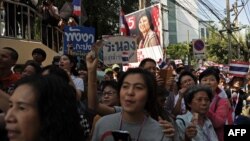BANGKOK —
Thailand's ruling party is virtually assured of a victory in Sunday's elections, but that alone is not likely to end the country's political crisis. Legal challenges after the vote also pose a threat to the governing party, despite popular support.
Thai Prime Minister Yingluck Shinawatra has so far remained defiant in the face of weeks of street protests calling for her and her government to resign.
With a boycott by the main opposition Democrat Party, the ruling Pheu Thai Party looks set to win the vast majority of seats in Sunday's general elections. But legal analysts say the government faces several challenges in the weeks ahead, from the elections as well as court petitions and investigations into corruption.
Several constituencies - mostly in the southern provinces - failed to register candidates, while in Bangkok pre-voting was disrupted by anti-government protesters.
Dej-Udom Krairit, president of the Lawyers Council of Thailand, believes the threats of the election being annulled are real. "Judging from the current situation, it's going to be very difficult to carry on the election. There's no hope for success -- and they cannot prolong. The peaceful move against the government is doing quite well actually, and the government, now to see how long they are going to stand for it," Krarit stated.
Pro-government activists and other groups favoring the poll are urging voters to go cast ballots Sunday. But there are fears of violence, especially in Bangkok after ugly incidents last Sunday when voters clashed with anti-government protesters seeking to prevent the poll going ahead.
Somphob Manarangsan, an economics professor, said independent bodies such as the courts and anti-corruption commission may also leave the government more vulnerable.
"The work of independent organizations like the corruption commission and also the constitution court; there may be more judgements from those organizations making the government more paralyzed, then automatically you may have some mechanism to be used to make some breakthrough of the deadlock situation we have now," said Manarangsan.
A forced resignation of Yingluck's administration under the constitution would lead to appointment of an interim government - a key demand of the anti-government protest movement.
The government came under the spotlight with National Anti-Corruption Commission (NACC) allegations of corruption in the government's $19 billion rice price support scheme. The prime minister was chairperson of the national rice policy committee.
NACC commissioner and spokesman, Vicha Mahakhun, said the commission has taken on several dozen cases of government corruption - more than under the previous administration led by Abhisit Vejjajiva.
"About this government we have 45 complaints of corruption against this government that we have in the process of inquiry about 12 cases and 22 cases are in the process of fact finding and the NACC is also currently investigating about the cases of the previous Abhisit government - over a dozen cases involved with the corruption," stated Mahakhun.
International corruption watchdog Transparency International in 2013 ranked Thailand at 102 out of 177 countries in its corruption perception index, even lower than an already low ranking of 80 when Yingluck's government came to power in 2011.
Bandid Nijathaworn, president of the Thai Institute of Directors and former deputy central bank governor, said the deteriorating corruption situation needs to be addressed.
"The rice pledging and also the actions that are being taken by the NACC is clearly an example of the needs to better systems of governance, especially the check and balance on the quality of government policies that would have long term implications for the financial position of the country - huge losses and also expose the project or the scheme to huge corruption risk," explained Nijathaworn.
In December the constitutional court accepted an opposition petition concerning the legality of a $70 billion government infrastructure spending program. Critics claim the legislation avoids adequate parliamentary oversight. The ruling party also faces legal challenges over parliamentary moves to amend the constitution.
A verdict against the government may yet force the resignation of the prime minister, leaving Thailand trying to overcome even more uncertainties over the way forward from its political crisis.
Thai Prime Minister Yingluck Shinawatra has so far remained defiant in the face of weeks of street protests calling for her and her government to resign.
With a boycott by the main opposition Democrat Party, the ruling Pheu Thai Party looks set to win the vast majority of seats in Sunday's general elections. But legal analysts say the government faces several challenges in the weeks ahead, from the elections as well as court petitions and investigations into corruption.
Several constituencies - mostly in the southern provinces - failed to register candidates, while in Bangkok pre-voting was disrupted by anti-government protesters.
Dej-Udom Krairit, president of the Lawyers Council of Thailand, believes the threats of the election being annulled are real. "Judging from the current situation, it's going to be very difficult to carry on the election. There's no hope for success -- and they cannot prolong. The peaceful move against the government is doing quite well actually, and the government, now to see how long they are going to stand for it," Krarit stated.
Pro-government activists and other groups favoring the poll are urging voters to go cast ballots Sunday. But there are fears of violence, especially in Bangkok after ugly incidents last Sunday when voters clashed with anti-government protesters seeking to prevent the poll going ahead.
Somphob Manarangsan, an economics professor, said independent bodies such as the courts and anti-corruption commission may also leave the government more vulnerable.
"The work of independent organizations like the corruption commission and also the constitution court; there may be more judgements from those organizations making the government more paralyzed, then automatically you may have some mechanism to be used to make some breakthrough of the deadlock situation we have now," said Manarangsan.
A forced resignation of Yingluck's administration under the constitution would lead to appointment of an interim government - a key demand of the anti-government protest movement.
The government came under the spotlight with National Anti-Corruption Commission (NACC) allegations of corruption in the government's $19 billion rice price support scheme. The prime minister was chairperson of the national rice policy committee.
NACC commissioner and spokesman, Vicha Mahakhun, said the commission has taken on several dozen cases of government corruption - more than under the previous administration led by Abhisit Vejjajiva.
"About this government we have 45 complaints of corruption against this government that we have in the process of inquiry about 12 cases and 22 cases are in the process of fact finding and the NACC is also currently investigating about the cases of the previous Abhisit government - over a dozen cases involved with the corruption," stated Mahakhun.
International corruption watchdog Transparency International in 2013 ranked Thailand at 102 out of 177 countries in its corruption perception index, even lower than an already low ranking of 80 when Yingluck's government came to power in 2011.
Bandid Nijathaworn, president of the Thai Institute of Directors and former deputy central bank governor, said the deteriorating corruption situation needs to be addressed.
"The rice pledging and also the actions that are being taken by the NACC is clearly an example of the needs to better systems of governance, especially the check and balance on the quality of government policies that would have long term implications for the financial position of the country - huge losses and also expose the project or the scheme to huge corruption risk," explained Nijathaworn.
In December the constitutional court accepted an opposition petition concerning the legality of a $70 billion government infrastructure spending program. Critics claim the legislation avoids adequate parliamentary oversight. The ruling party also faces legal challenges over parliamentary moves to amend the constitution.
A verdict against the government may yet force the resignation of the prime minister, leaving Thailand trying to overcome even more uncertainties over the way forward from its political crisis.














